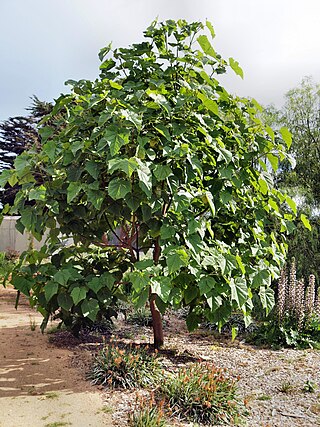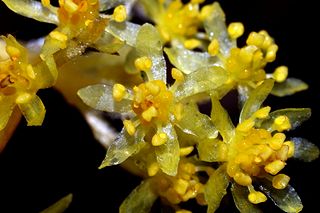Gleditsia rolfei is a leguminous tree in the family Fabaceae. It is found only in southern Taiwan, where it grows in the Hengchun Peninsula. It is threatened by habitat loss.

Garcinia linii is a species of flowering plant in the family Clusiaceae. It is found only in Taiwan. It is threatened by habitat loss.
Calamus inermis is a species of flowering plant in the family Arecaceae. It is found native to the Yunnan region of China and Indochina. Its natural habitat is subtropical or tropical seasonal forests. It is threatened by habitat loss.
Acalypha hontauyuensis is a species of plant in the family Euphorbiaceae. It is a shrub endemic to Orchid Island, Taiwan. The Flora of China, however, lists it as a synonym of Acalypha suirenbiensis from the Taiwanese mainland.
Eurycorymbus cavaleriei is a species of plant in the family Sapindaceae and the single species in the genus Eurycorymbus. It is found in China and Taiwan, where it is threatened by habitat loss.
Glyptopetalum lawsonii is a species of flowering plant in the family Celastraceae. It is endemic to Tamil Nadu in India.

Glyptopetalum is a genus of plant in the family Celastraceae.
Neolitsea daibuensis is a species of plant in the family Lauraceae endemic to Taiwan. It is a small semi-deciduous tree that grows in the broad-leaved forests in southern Taiwan at altitudes of 800–1,000 m (2,600–3,300 ft). It is threatened by habitat loss.

Paulownia kawakamii, commonly known as the sapphire dragon tree, is a tree species in the family Paulowniaceae.
Photinia lasiopetala is a species of flowering plant in the family Rosaceae. It is endemic to Taiwan. It is threatened by habitat loss.
Prunus transarisanensis is a species of plant in the family Rosaceae. It is endemic to Taiwan. The similar species Prunus takasagomontana, also endemic to Taiwan, is thought by some authorities to be conspecific.

Pyracantha koidzumii commonly known as Formosa firethorn or Taiwan firethorn, is a species of plant in the family Rosaceae. It is threatened by habitat loss.

Rhododendron kanehirai is a species of plant in the family Ericaceae. It was originally endemic to Taiwan. It has become extinct in the wild, though it still exists in cultivated form.

Salix kusanoi is a species of willow in the family Salicaceae. It is endemic to Taiwan. It is threatened by habitat loss.

Sassafras randaiense is a species of deciduous tree in the family Lauraceae belonging to the genus Sassafras. It is a relict species endemic to Taiwan. It is threatened by habitat loss.

Symplocos shilanensis is a species of plant in the family Symplocaceae. It is endemic to Taiwan. It is threatened by habitat loss.
Symplocos trichoclada is a species of plant in the family Symplocaceae. It is endemic to Taiwan.

Cunninghamia konishii is an endangered species of tree in the cypress family, Cupressaceae. It is native to southeast China (Fujian), Taiwan, Laos and Vietnam.
Glyptopetalum quadrangulare is a plant in the family Celastraceae. The specific epithet quadrangulare means 'four-angled', referring to the winged twigs.

Shuanglianpi Wetland is a partially protected natural area in Yilan County in northern Taiwan. Situated 470 meters above sea-level, it contains a botanically rich, shallow lake, which, from the perspective of plant species density, is considered to be a wetland with global significance by the Forestry Bureau of Taiwan.










